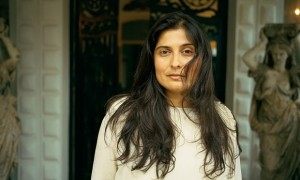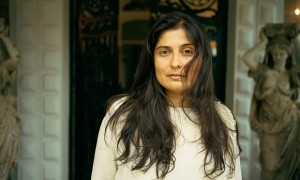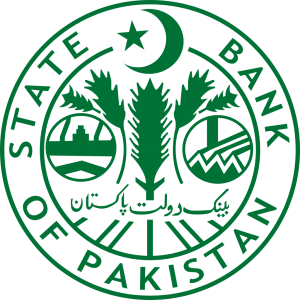- In 2014, Saba Qaiser was shot in the head by her father and dumped in a river. She survived. Now Sharmeen Obaid Chinoy wants her Oscar-nominated film about Saba to expose the shameful crime Pakistan has ignored for too long
Sharmeen Obaid Chinoy is a documentary film-maker whose 2012 film about acid violence, Saving Face, made her the first Pakistani to win an Academy Award. This year, she is nominated again for A Girl in the River: The Price of Forgiveness, which tells the story of 19-year-old Saba Qaiser, from the Pakistani province of Punjab, whose father and uncle shot her in the face and threw her in a river because she had married without her family’s consent. Because she had tilted her head at the last minute, Saba survived the shooting and managed to get to a petrol station for help. But although her father and uncle were subsequently arrested, Saba came under pressure to forgive them, which under Pakistani law means they would escape further punishment.
How did you come across Saba’s case?
I wanted to tell a story about “honour” killings, from the perspective of somebody who had survived, because almost always victims of “honour” crime die, and it’s very hard then to tell the story, because you never have the perspective of that person and what they went through. So I was searching for a survivor, and one day I read in the newspaper that a girl had been shot and put in a gunny bag and thrown in a river, and survived, and was in a hospital. So I went off to try and find that hospital.
And obviously you did…
Yes, I found her in hospital – it must have been about two days after she had been shot. We got permission from the hospital, and we spent a lot of time speaking to her; you know, she was very open to telling her story because she believed very strongly that she didn’t want anyone else to go through what she had.
She must have been in a
great deal of pain, and shock?
She was. She had this extraordinary kind of will though – this defiant will about her, even on day one. And she just took to filming matter-of-factly, as if she was born for the camera. But she never did anything extra for the camera, she was who she was; and you see that as the film progresses, you see her demeanour, the way she reacts, the way she laughs – it’s all very natural.
She was also facing the immensely painful reality of her own family having tried to kill her, and now ostracising her. How common is that situation?
It is a pretty common narrative, because about a thousand women are killed in “honour” crimes in Pakistan every year; and we think the number is much higher because many cases go unreported. The problem with “honour” killing is that it’s considered in the domain of the home. People hush it up: a father kills a daughter, and nobody ever responds, nobody ever files a case. The victim remains nameless and faceless, and we never hear about them. People feel, “if we register a case, it will bring shame to the family”. So this [film] is a way for us to bring it out in the open, to have a national discourse about it, for us to say this is a crime, it has nothing to do with honour; it’s premeditated, cold-blooded murder.
What has the reaction
in Pakistan been like?
One of the most encouraging things was that the prime minister made a statement after the [Academy Award] nomination. He said that he would look into this matter and he would work on “honour” killings and he wanted to hold the first screening at his residence. Now, that is a very brave statement to make, it’s also a very forward-thinking statement. And we are now waiting to hear back from the government about a date to hold the first screening; we are hopeful that he will follow through on his statement.
And your view is that a
change in law is the fundamental aim?
The thing about “honour” crimes is that there are people who don’t think that it is a crime because people don’t go to jail for it. If you have entire towns and villages where people know of people who have killed their daughters or their wives or their sisters and never been to jail, you will think it is not a crime. As long as people don’t think it’s a crime, they will continue to kill women. The minute people start going to jail, it will act as a deterrent. People will know that there are serious repercussions and that it is a heinous crime. We have to take that first step of sending people to jail.
One of the most disturbing aspects of A Girl in the River is the way Saba’s father believes that his actions have served as a warning to his other daughters, and that his standing in the community will improve.
As you see at the end of the film, he feels more empowered, that he has done something right, and that people in the community grant him more respect, and he says that his other daughters are getting very good proposals [of marriage.] This is exactly what happens: this grandstanding that takes place, people become huge in their community, they aren’t looked on as criminals. So of course if he had gone to jail, the narrative would have been very different. It’s also extraordinary to see how the female members of Saba’s family backed her father up.
Well, you know, they’ve been brainwashed to believe that this is something that would elicit this kind of response. His sister was the most shocking for me: she said, well, what she did expect? She ran away. She got married out of her choice. This was bound to happen.
Your work puts Pakistani society under the microscope – but how much do you think it is changing?
Pakistan is changing rapidly. Sixty per cent of the population is under the age of 25, you have a high use of cellphones, of the internet. How long will people be able to hold women back? More women are going to college and schools, and I see cracks in traditional society. More and more women know their rights because of how interconnected they are; they’re no longer isolated. Even in the remotest of villages you have cellphones now, and of course this is going to shake the status quo in a patriarchal society… Women now want a greater say, they want greater economic independence, they want a greater say in the kind of marriages they make, the kind of education they get, where they work. You find this more often more in second-tier cities and in major cities, but the time is not far off when it’s going to seep down to other places as well.Even if a woman is not educated, she is learning on the cellphone how to send messages; the cellphone is transforming Pakistan.
How much do you see your role as enabling and pushing for change as well as simply documenting what you see around you?
I like to talk about the things that people don’t like to talk about. I like to have the difficult conversations. I want people to feel uncomfortable about issues. While society is changing rapidly, there are all of these issues that we’re not addressing. We think that by hiding them, they will go away. My documentation is not only of the issues, but also of the people who are fighting them, the heroes you don’t know, the nameless people who are risking their lives every day.





